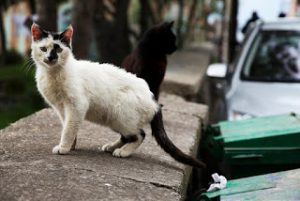October 13, 2016
Different Cats, Different Solutions

Too many cats will live wretched lives as long as there are too many cats.
As our new Mobile Spay/Neuter Vehicle hits the streets, the prospect for long-term solutions to cat overpopulation and cat welfare are becoming clearer. The thing is, cats in our community live in very different circumstances, there are many reasons for the problems, and all need tailored solutions.
A significant source of overpopulation is feral cats. Feral cats are not stray. They are generally the progeny of stray or roaming cats and have never lived with humans. They are not wildlife, nor are they pets. Their lives are generally nasty, brutish and short. According to the experts, our friends at Alley Cat Allies, adults cannot ever be truly socialized to humans, though their young kittens can be.
Then there are “porch” or “loosely owned” cats. These cats are socialized to humans, though may be very skittish. They have, or had, an owner and are fed and loosely cared for by a neighbourhood. Unfortunately, the neighbourhood’s care rarely extends to veterinary care or sterilization. Therefore, these cats are a significant source of unwanted litters. Those not vaccinated can be a reservoir for contagious feline disease.
It can be hard to identify a skittish stray or porch cat from a true feral cat. But in a shelter, socialized porch or owned cats will generally calm with time. Feral cats do not, and may injure themselves, sometimes severely, trying to escape. Their stress can be so intense that they can die of heart failure in a cage. It is not humane to shelter a severely distressed feral cat.
The issues of each type of cat are very different and require different solutions. Since most feral cats cannot be humanely housed, the standard humane practice is “TNR,” or trap/neuter/release, that is, capture, sterilize and vaccinate, and release them where they were found. Feral cat colonies can be phased out over time through TNR. The OHS assisted volunteers to phase out the famous Parliament Hill colony several years ago through TNR in advance of government intervention that may have seen the entire colony euthanized. The OHS will support other feral colony caretakers under certain conditions through free food and sterilization at our clinic.
Porch cats can and should be socialized and rehomed. If they are rehomed through the OHS, they will leave healthy, vaccinated and sterilized to a good home that is ready and able to care for them. They will no longer contribute to cat overpopulation.
I am feeling very positive and hopeful that our efforts are going to produce very significant results and quickly, changing the world for Ottawa’s cats by resolving the problem identified in the OHS’s new five-year strategic plan, that is, too many cats will live wretched lives as long as there are too many cats.
Bruce Roney
Executive Director
